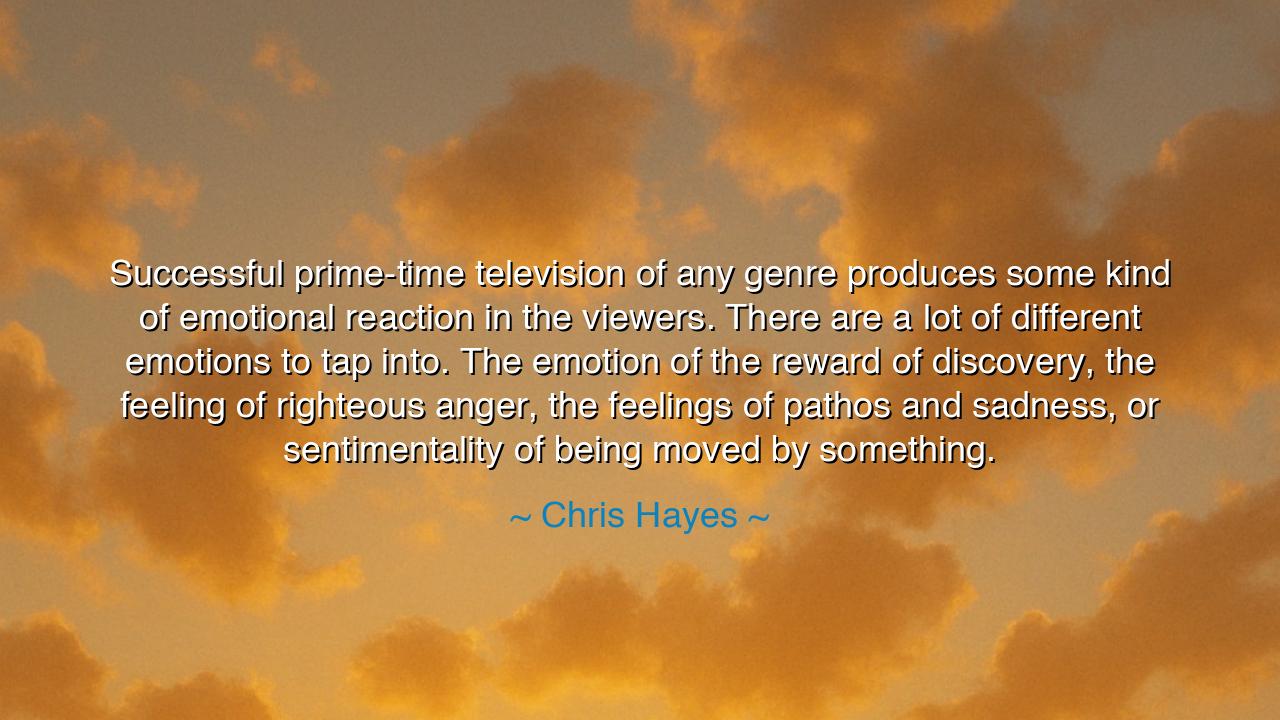
Successful prime-time television of any genre produces some kind
Successful prime-time television of any genre produces some kind of emotional reaction in the viewers. There are a lot of different emotions to tap into. The emotion of the reward of discovery, the feeling of righteous anger, the feelings of pathos and sadness, or sentimentality of being moved by something.






Host: The room feels thoughtful, with the soft light of evening casting a warm, contemplative glow. Outside, the world continues its usual rhythm, but inside, the atmosphere feels focused, as though the conversation is about to touch on the power of emotion in storytelling. Jeeny sits at the table, her fingers lightly tracing the rim of her cup, her expression reflective. Jack stands near the window, arms crossed, gazing out at the street below.
Jeeny: (her voice gentle, yet filled with curiosity) “You ever think about how storytelling, especially in television, works by tapping into deep emotions? How the best shows don’t just entertain us, but make us feel something—something that sticks with us after the episode ends?”
Jack: (glancing over at her, his voice dry, but intrigued) “Emotional storytelling? Yeah, it’s interesting how shows use different emotions to engage viewers. It’s not just about the plot—it’s about how the emotions are woven in to make the audience connect. What made you think about it?”
Jeeny: (nodding slowly, a small smile forming as she shares her thought) “I was thinking about something Chris Hayes said: ‘Successful prime-time television of any genre produces some kind of emotional reaction in the viewers. There are a lot of different emotions to tap into. The emotion of the reward of discovery, the feeling of righteous anger, the feelings of pathos and sadness, or sentimentality of being moved by something.’ It made me reflect on how the best shows aren’t just about a story—they’re about creating emotional experiences that resonate with the audience.”
Jack: (pauses, considering her words carefully) “So, he’s saying that successful TV shows don’t just focus on the plot—they tap into a range of emotions, from discovery to anger, sadness, and sentimentality. The goal is to move the audience, to make them feel deeply, because that’s what keeps them engaged?”
Jeeny: (smiling more deeply now, her eyes steady as she explains further) “Exactly. Hayes is pointing out that emotions are at the heart of what makes TV shows connect with viewers. The best shows aren’t just about the characters or the events—they’re about the emotions they provoke. Whether it’s the satisfaction of discovery, the anger at injustice, or the emotional weight of a sad moment, those feelings are what make the stories impactful and memorable.”
Host: Jeeny’s words seem to linger in the room, creating a subtle shift in the conversation about how emotions shape our connection to storytelling. Jack stands still, his expression softening as he processes the deeper meaning behind Hayes’ statement. The world outside continues its rhythm, but inside, the conversation feels rooted in a more profound understanding of the power of emotion in art.
Jack: (his voice quieter now, almost reflective) “I see what he means. It’s not just about telling a story—it’s about creating an emotional journey for the audience, something that keeps them invested and engaged. When a show taps into those deep emotions, it becomes more than just entertainment—it becomes something that resonates with us on a personal level.”
Jeeny: (nodding, her voice calm, yet filled with quiet strength) “Exactly. Emotions are what allow us to connect with the story, to see ourselves in the characters and situations. The best stories make us feel something real, whether it's joy, sorrow, anger, or hope. And that emotional connection is what makes a show memorable, long after it’s over.”
Jack: (pauses, a small smile forming on his face as the idea sinks in) “It’s liberating, isn’t it? To realize that the power of a great show isn’t just in the script or the actors—it’s in the emotions it stirs in the audience. It’s the emotional journey that leaves an impression, not just the plot.”
Jeeny: (smiling warmly, her voice gentle, yet filled with wisdom) “Exactly. The emotions that a story evokes are what make it impactful, what make it stick with us. It’s about creating experiences that feel real, even if they’re fictional, and tapping into universal emotions that everyone can relate to.”
Host: The room feels lighter now, as though the conversation has shifted into a deeper appreciation for the role of emotion in storytelling. Jack turns from the window, his posture more relaxed, his thoughts clearly reflecting on how emotions shape the stories we connect with. Jeeny watches him, content in the realization that true storytelling isn’t just about the plot—it’s about creating emotional connections that leave a lasting impact. The world outside continues its rhythm, but inside, there’s a shared understanding that the best stories resonate because of the emotions they stir within us.






AAdministratorAdministrator
Welcome, honored guests. Please leave a comment, we will respond soon